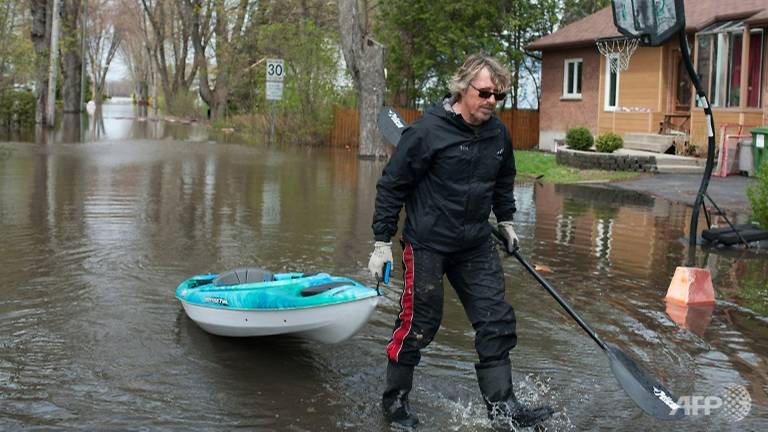Canada's army rolls in after devastating floods
 |
| A man walks while pulling his canoe on the flooded streets in Pierrefonds on May 7, 2017. (Photo: AFP/Catherine Legault) |
Several rivers and lakes have overflowed their banks in Quebec province, between Gatineau in the Canadian capital region and Montreal 200 kilometres (125 miles) downstream.
The ground is saturated and unable to absorb any more water.
But recent heavy rains have started to subside and "as of Wednesday, we expect to see the situation begin to improve," Quebec Public Safety Minister Martin Coiteux announced.
Some 2,500 homes in Quebec and more than 300 in Ontario have been flooded, and at least 1,500 people have been ordered to evacuate - most of them in the Canadian capital region.
In Pierrefonds, one of the hardest-hit regions near Montreal, Johanne Aubin spent the morning pumping water from her basement using a pump from her backyard swimming pool.
The flooding took her and most others here by surprise, and she barely had time to erect a small sandbag wall around her property.
After days of fighting an exhausting battle to hold back the waters, often in vain, despair has started to set in.
Most of the streets here are flooded, forcing locals to travel by canoe or other small boat.
Resident David Swidzinsky has been ferrying neighbours to safety, or back to their homes to collect precious belongings that had been missed in the rush to get out when a state of emergency was declared.
People "broke out in tears (seeing the devastation) when I brought them home to fetch their bags," he said.
A few streets over, a dozen soldiers tirelessly filled sandbags. Across eastern Canada, hundreds of thousands of sandbags have been used and Ottawa has asked suppliers for up to four million more, said officials.
Pierrefonds resident John Parker spent his day hauling wet furniture and personal belongings to the curb, as a pump and hose sputtered water from his flooded basement over another wall of sandbags.
"It just kind of tires you out. You move around, get one window fixed and the next window gets full of water," he told AFP. "It's surrounded the whole house now, and it's coming into the garage. It will get better, because it can't get any worse," he said.
The Canadian army has deployed 1,650 troops to help stem the flooding, reinforcing dikes, protecting critical infrastructure including water treatment facilities and bridges. Military helicopters and boats also are on standby.
'DEALING WITH IMPONDERABLES'
"With this kind of a disaster, it's not where there's a singular event like a dam bursting or a building exploding or a bridge collapsing," commented Public Safety Minister Ralph Goodale.
"This is the gradual building of precipitation where circumstances physically on the ground can change dramatically without notice in a very short span of time. So everybody was dealing with imponderables."
Goodale called it the worst Canadian flood in "50 years" but added that the situation was improving in Ontario, where high water levels in Lake Ontario threatened coastal communities including parts of Toronto, Belleville to the east and the Thousand Islands region, which is home to fabled 19th century mansions and cottages.
"I have never seen so much water between Ottawa and Montreal," Sophie Gregoire-Trudeau, the wife of the prime minister, told broadcaster RDI.
The day before, Prime Minister Justin Trudeau accompanied by his two young children, had traveled to the town of Terrasse Vaudreuil west of Montreal to help locals fill sandbags.
There are "exceptional circumstances" behind the flooding, explained Quebec Environment Minister David Heurtel, pointing to a month of rain coming on the heels of a spring thaw after a "severe winter."
Although it is unlikely to get any worse as of Monday, "the situation will last a few weeks," said Coiteux.
Ottawa Mayor Jim Watson said the recovery and cleanup from this "historic flood" will take time.
Sunday evening, a 37-year-old man and his two-year-old daughter were reported missing after their car veered into a river and was swept away near Sainte-Anne-des-Monts in the Gaspe region of eastern Quebec.
In British Columbia, on the opposite side of the country, the same combination of rain and snowmelt has caused flooding and mudslides that left at least two people missing, including the fire chief of the village of Cache Creek who had been out checking water levels.
What the stars mean:
★ Poor ★ ★ Promising ★★★ Good ★★★★ Very good ★★★★★ Exceptional
Latest News
More News
- Russian President congratulates Vietnamese Party leader during phone talks (January 25, 2026 | 09:58)
- Worldwide congratulations underscore confidence in Vietnam’s 14th Party Congress (January 23, 2026 | 09:02)
- Political parties, organisations, int’l friends send congratulations to 14th National Party Congress (January 22, 2026 | 09:33)
- 14th National Party Congress: Japanese media highlight Vietnam’s growth targets (January 21, 2026 | 09:46)
- 14th National Party Congress: Driving force for Vietnam to continue renewal, innovation, breakthroughs (January 21, 2026 | 09:42)
- Vietnam remains spiritual support for progressive forces: Colombian party leader (January 21, 2026 | 08:00)
- Int'l media provides large coverage of 14th National Party Congress's first working day (January 20, 2026 | 09:09)
- Vietnamese firms win top honours at ASEAN Digital Awards (January 16, 2026 | 16:45)
- ASEAN Digital Ministers' Meeting opens in Hanoi (January 15, 2026 | 15:33)
- ASEAN economies move up the global chip value chain (December 09, 2025 | 13:32)
















 Mobile Version
Mobile Version